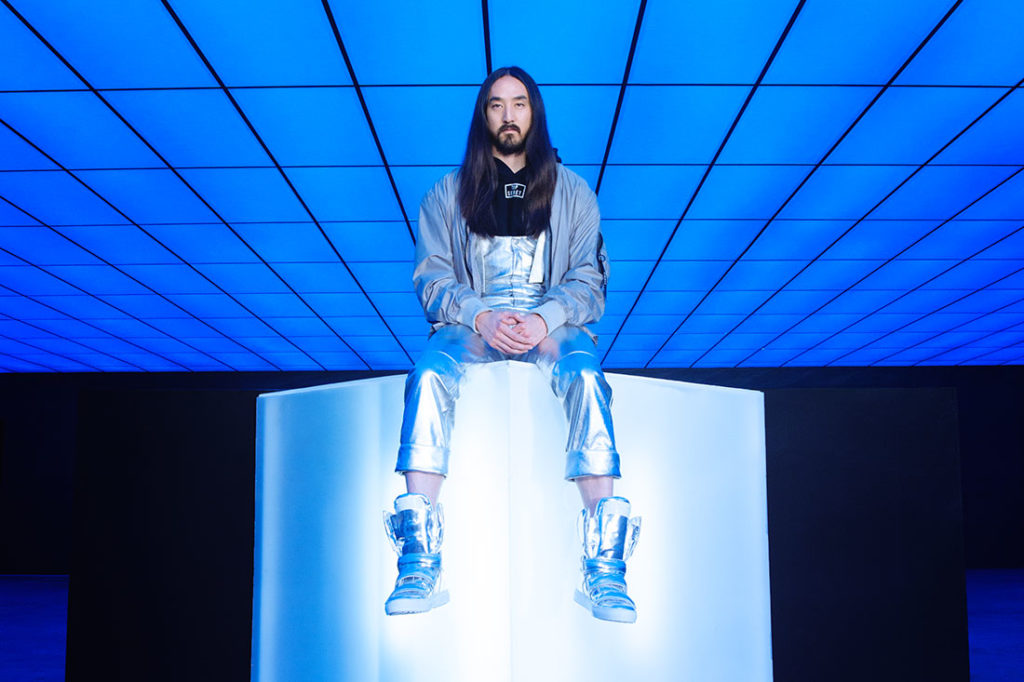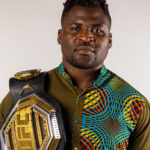He exists somewhere between the definitions of “contrast” and “balance.”
Anyone who embraces contrast, like Steve Aoki does, runs the risk of being misunderstood as a walking contradiction, and the international superstar DJ’s life is certainly full of contrasts disguised as contradictions.
Take Aoki’s fame in the electronic dance music (EDM) scene, which may or may not be your thing, but is a scene nonetheless. His social platforms now receive over 100 million views each month, and he’s one of the most sought-after headliners of major music festivals in the world. Contrast that with the earlier role he played in breathing life into Los Angeles’s underground music culture back in the ’90s.
On one hand, he’s a savvy entrepreneur with stakes in the fashion, arts, and gaming industries, as well as his own fitness app, pizza chain, comic book series, and podcast. Then there is his onstage persona, which is so raucous that he’s turned “cake” into a verb by heaving sheet cakes directly into the faces of willing fans at every show.
He is the son of Rocky Aoki, founder of the restaurant chain Benihana, and yet his early DIY music projects were all run on a shoestring budget. The Dim Mak Records label he founded in 1996, spawning his eventual success, began without any financial support or guidance from his father.
The scheduling of my interview with Aoki was an exercise in contrast all its own. I negotiated with multiple publicists through dozens of emails and screened questions in order to pin down an exact time, three weeks in advance, when I could speak with him. Then came the actual conversation, which was casual, illuminating and mostly off-script.
So you can probably see how all of these things might look like contradictions. To live in a world of contradiction is to live a life where everything is always moving. From the outside, this appears to be the type of world that Aoki lives in—he holds the Guinness World Record for “most traveled musician in a calendar year” and the Netflix documentary about his life is titled I’ll Sleep When I’m Dead.
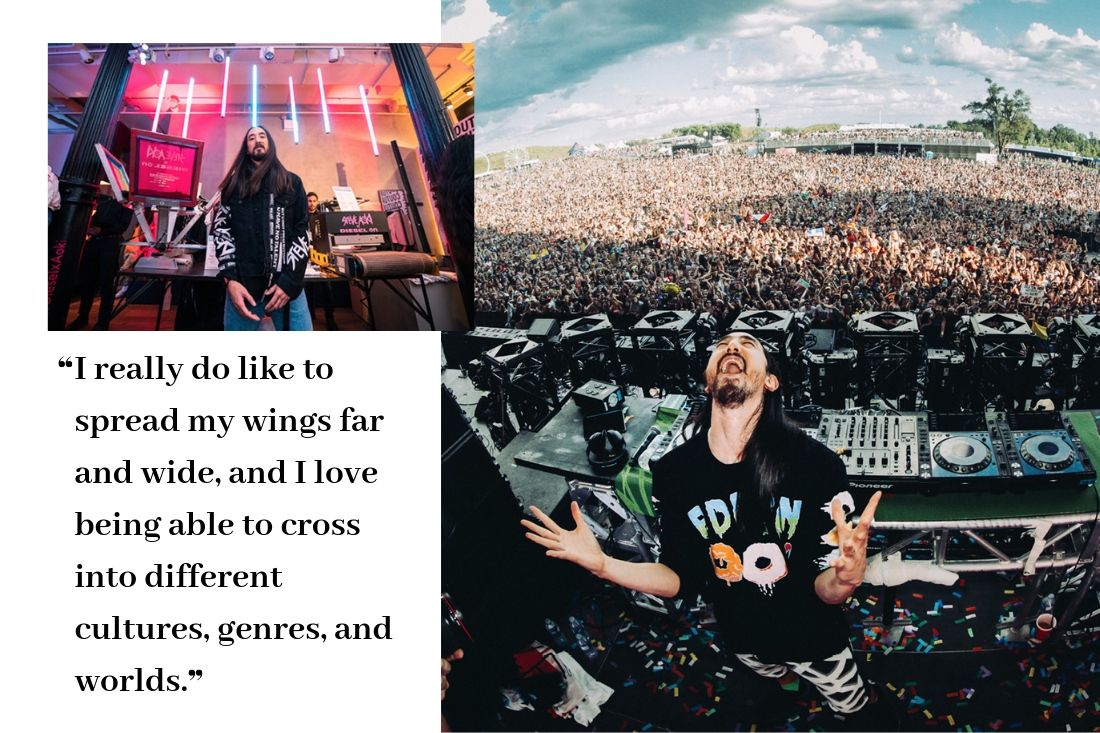
But that’s all just the way it appears. To live at the intersection of contrast and balance is to live a life of movement in which a few specifically calculated things are meant to always stand still. Whether it’s principles or creative processes or family, there must be constants to provide the balance.
So, what I really wanted to discover in my conversation with Aoki were his thoughts on success and whether it stood still or moved with the chaos. As it turns out, he’s been thinking about that a lot recently.
Related: What Is Success?
* * *
Aoki is an objectively successful person. Forbes listed him as the fourth highest-paid DJ of 2018 with $28 million earned. He has two Grammy nominations. He’s worked with dozens of the biggest names in music and has been cheered on by adoring fans in just about every country you could want to visit.
Sometimes, when you’re talking to a successful person, there’s a small part of you that doesn’t have the patience for all the nuance that makes that person who he is. That part of you just wants to know: What’s the secret?
So it was about 45 minutes into our conversation that I asked Aoki how he defined success.
“Success comes from wisdom, which takes time,” he says. Fortunately for me, our conversation came on the heels of Aoki completing his forthcoming memoir BLUE: The Color of Noise.
The book uses the color blue as a narrative thread to tell a series of stories throughout Aoki’s life. Many of those stories trace back to the days when Aoki was a vegan college student in a Santa Barbara student cooperative who turned his tiny apartment into a concert venue. They called it the “Pickle Patch” and it gained notoriety for its quirkiness and the way it drew in musical talent.
Aoki played some music himself, but his obsession was with being a conduit for the young, energetic music scene of Los Angeles in any way he could. He founded Dim Mak Records around that time and spent hours at Kinko’s printing posters or putting logos on T-shirts. What young Aoki didn’t realize was that what he was doing was building a brand. He wasn’t making any money; he was just trying to continue the excitement for him and for other people like him.
“I understood it not as a business but as a culture,” he says. “Whatever I was putting my time and energy into was part of a cultural necessity. This was my way of contributing to a very small little world that was so small that if I didn’t contribute, it actually put a dent into that world.”
Dim Mak Records would go on to foster numerous influential underground artists and put on shows that eventually connected Aoki with some of the biggest names in the music industry, including the likes of Kanye West. But at the time, these outcomes were peripheral to the scene that he was helping create. “That participation is what your purpose is. What you can get from it is not the point of doing it.”
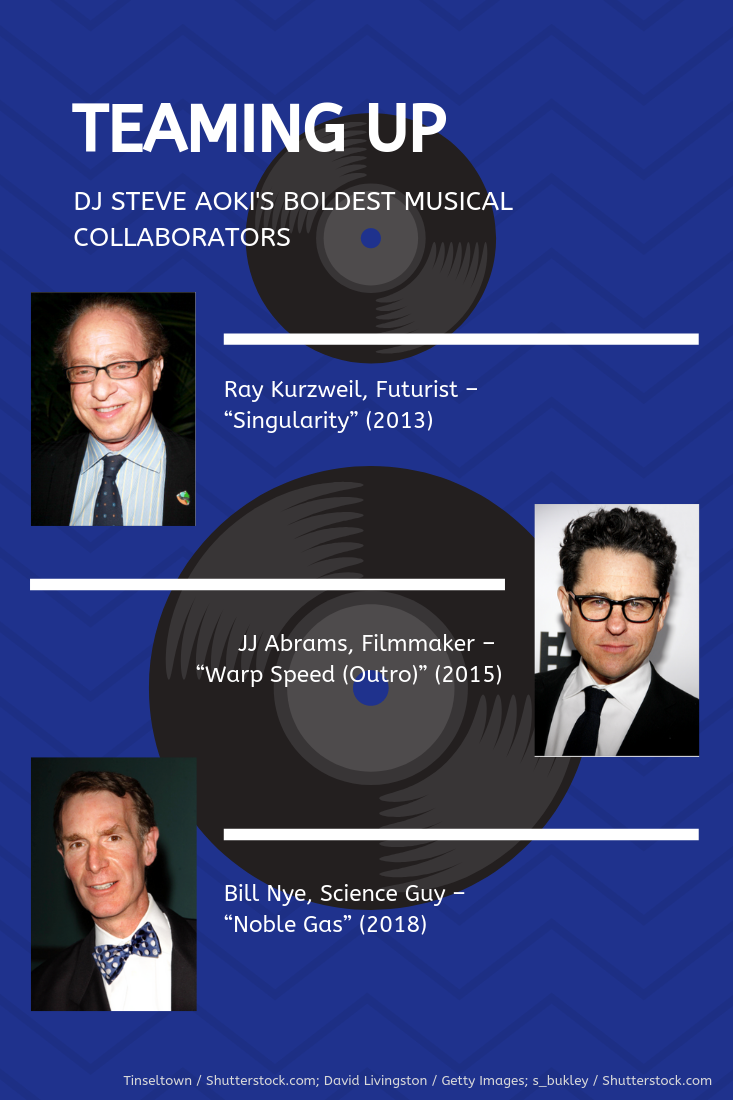
Now that Aoki is one of the biggest names in entertainment, there’s a reason that brand-building seems to come so naturally: It’s because the self-image he’s creating is in service of the things that he cares about. He wants to see people speaking different languages at his concerts. He wants them to visit Japan. He wants them to be optimistic.
“It’s not about money or ego,” he says. “[Success] is how you’re willing to apply yourself in a way that’s above average.”
“When I get in the studio I just want to melt minds with people.”
This sounds like pretty standard stuff coming from an electronic dance musician and DJ. But for Aoki the emphasis is on those last two words: with people. The success that he’s achieved across various platforms obviously requires a certain amount of talent, but the skill that’s best served him over his 20-year career has been collaboration. He’s worked with a pretty eclectic mix of people inside and outside of the music industry including directors, scientists and futurists. Aoki’s albums have featured rock bands like Linkin Park, Fallout Boy, and Blink 182 as well as hip-hop acts like Migos, Gucci Mane, and Lil Yachty.
“I’m an artist that’s known for collaborations because I collaborate a heck of a lot, and I collaborate across many genres and outside of music,” Aoki says.
Working with the types of artists that excite him couldn’t happen if he waited in his Las Vegas home for them to come to him. To tell the stories that he wants to tell, he’s had to do more than leave the confines of his house. He’s had to get outside of America.
“I really do spread my wings far and wide, and I love being able to cross into different cultures, genres, and worlds,” Aoki says. “EDM is a borderless genre.”
Travel with Aoki to Japan (or the Netherlands, or Italy, or Brazil) and you’ll realize this isn’t just empty rhetoric. These collaborations have circular effects. He’s cultivated a massive global fan base, in part due to his tireless touring, but he credits his songs with Israeli group Vini Vici, Korean pop band BTS, and Puerto Rican artists Daddy Yankee and Nicky Jam for not only attracting new fans to his work, but also broadening the tastes of his current fans.
He’s looked out and seen crowds of thousands singing in Italian, Spanish, English or any number of languages otherwise foreign to them. “It’s almost like that introductory factor of bringing cultures together.” That’s what his live shows are about. To experience music is something more than to hear it or witness it performed from a screen. Aoki’s lost count of the married couples who have told him they met at his shows.
“Music is such an emotional expression. It’s almost religious,” he tells me before pausing to consider that notion. “Or, it is. I think religion evokes a really similar reaction when you’re sacrificing your being to something with other people.”
Anyone who shares these kinds of connections with people all over the world is bound to get his fair share of opportunities outside of music. Aoki has partnered with such major brands as ASICS, Diesel Watches and Samsung, but he goes beyond the traditional role of endorser. To collaborate with Steve Aoki is to have him as a creative resource to draw from, and he wouldn’t have it any other way. “I’m not a very silent individual,” he says. “I want to collaborate, regardless of if they want me.”
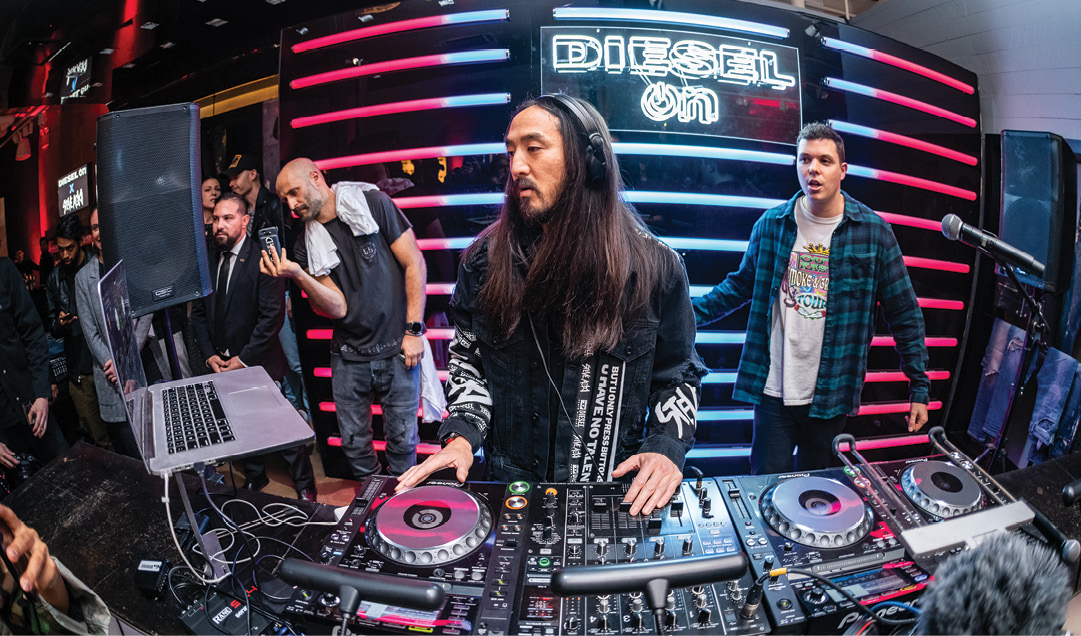
His app, Aoki Bootcamp, provides workout regimens, including streaming video of Aoki working out, tailored toward people with hectic lives full of travel. Aoki played 198 shows in 2018. He sometimes squeezed his workouts in directly after performances that ended around 3 a.m. or later. His Aoki ‘N Air podcast is dedicated to the food, culture, and music of Japan. Aoki’s parents were both from Japan, and it’s a place that he holds close to his heart. “Sometimes you get stuck in your world and your cycle of things and you forget how people communicate with each other,” he says. “In Japan, you realize how amazing human beings are. They treat each other just so wonderfully.”
It’s not hard to see how Aoki’s ventures connect to the rest of his life, but there’s a larger narrative at play here, and it’s something he’s branded “Neon Future.” He has released four successful albums, the most recent coming just this spring. And while that sounds abstract, it’s getting more definable with the release of a Neon Future comic book series through the content platform Impact Theory.
Neon Future is all about technology, which has tended to be depicted in a dystopian sense in popular culture. That’s not how Aoki sees the future. “I look at technology as what will enable us to become more imaginative and creative.” Aoki identifies as a humanist, who believes that we can use the tools of technology to survive and enhance the human experience. In the comics, augmented humans are the underdogs.
The Neon Future albums are meant to sound futuristic. He always imagined they would become animated or illustrated, and he sat in the writers’ room to help create the comics. “The next goal is definitely to bring it to television or the theater,” he says. “It needs to be played out that way. Neon Future is really an imaginative project. I think this is going to be the first step in something larger.”
To Aoki, each of these projects, from his live shows to his studio collaborations to his ventures outside of music, all exist in the same creative universe—think Star Wars or Game of Thrones.
Aoki is telling one global-scale story, and in his mind, we all have a role in it.
And the world keeps on spinning.
Related: 3 Creativity-Boosting Habits, Courtesy of the Universe
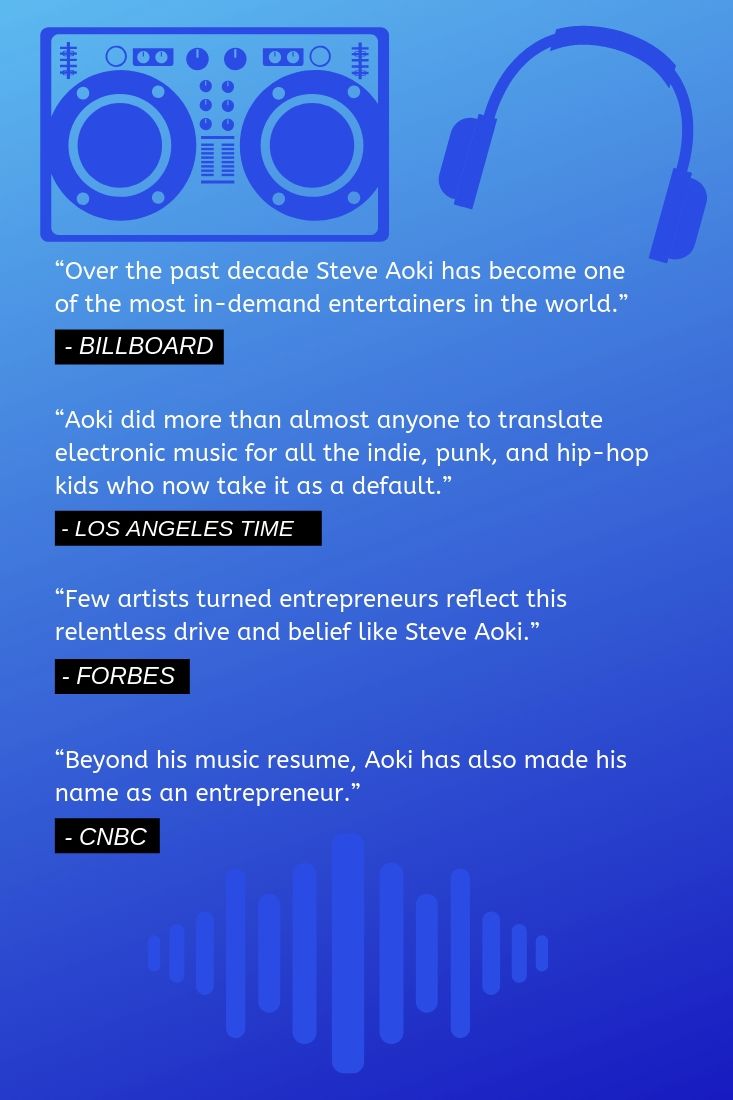
This article originally appeared in the September/October 2019 issue of SUCCESS magazine.
Photo courtesy of Steve Aoki



